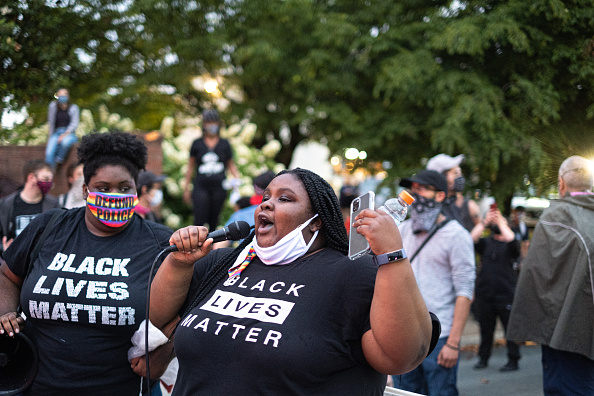(Dove Soap’s “fat liberation” ambassador, Zhahna Bryant, pictured center)
Dove Soap, a brand Unilever markets as a “real life version of beauty,” has launched a fat liberation campaign and is teaming up with a 22-year-old woman who amply fits the bill.
Zyahna Bryant, a woman who defends living in a “fat body” and is also known for her Black Lives Matter activism announced the endeavor with Dove on her Instagram page. The news comes as more reports affirm obesity is a growing problem in the United States, particularly among certain racial, ethnic, and geographic groups. Obesity is defined as having a body-mass index (BMI) number exceeding 30 BMI.
According to a report from the Centers for Disease Control (CDC), all states and territories have an obesity prevalence higher than 20 percent (one in five adults). Black adults with BMIs over 35 were prevalent in 38 states, the highest number for all racial groups.
An article in the Journal of the American Heart Association, published on September 19, looked at 281,135 obesity-related cardiovascular deaths between 1999 and 2020. During that period, age-adjusted mortality rates increased by a factor of three in the group of black adults with the highest incidence.
The CDC says people who are overweight or obese are at increased risk for all-cause death and morbidity. In any case, the agency encourages the use of terms such as “adults with obesity” rather than “obese adults.”
Fat Liberation, Plus
The partnership with Bryant is only one facet of the Dove’s efforts. A page on Dove’s website encourages consumers to sign a petition for the Campaign for Size Freedom and announces a partnership with the National Association to Advance Fat Acceptance (NAAFA) and Fat Legal, Advocacy, Rights and Education Project (FLARE).
“Join us to make body size discrimination illegal in the U.S.,” the website states. “Body size discrimination has a devastating impact on body confidence, and all areas of life.” The website offers no information on ways to combat excessive weight through diet and exercise.
Obesity is more than a body confidence issue, says Chad Savage, M.D., president of DPC Action and policy advisor to The Heartland Institute, which publishes Health Care News.
“Despite the appropriate desire to be polite and kind to people with a variety of medical disorders, attempts to celebrate and glamorize morbid obesity are neither kind nor compassionate,” said Savage. “They support behaviors that can lead to the destruction of that person’s joints, leading to a loss of mobility, crippling strokes, devastating heart attacks, certain cancers, severe respiratory conditions such as obesity hypoventilation, and premature death.”
One of the Biggest Cost Drivers
It is important to note that obesity is one of the biggest cost drivers in health care, says Eric Novak, M.D., an orthopedic surgeon in Arizona.
“We have abandoned the role of personal responsibility for maintaining and addressing our health needs,” said Novak. “All the fancy health plan designs in the world will do little in the face of institutionalized and celebrated unhealthiness, but it will funnel billions, no trillions, to people whose job it is to maintain the fiction that much of health costs little … so the healthy massive supermajority is willing to massively overpay to inefficiently subsidize the five percent of people who spend half of all health care dollars.”
Dove’s campaign is not unique, with multiple companies featuring obese models in recent years in advertisements.
“Though we should all behave with kindness and compassion toward people who struggle with weight issues, it is not truly compassionate to support the behaviors of someone you love in their own self-destruction,” said Savage.
‘Americans Inherently Understand’
It is encouraging that people still spend a great deal of money on gym memberships, supplements, and weight-loss programs, indicating they recognize the health risks or don’t find obesity attractive, says Savage.
“Despite the attempts to glamorize obesity, the overwhelming demand by the populace for blockbuster weight-loss drugs such as Wegovy indicates that Americans inherently understand this,” Savage said.
Wegovy is a prescription drug approved by the Food and Drug Administration in 2021 for those with a BMI of 30 or greater, or 27 or greater with other health problems
Ashley Bateman (bateman.ae@googlemail.com)writes from Virginia.




















